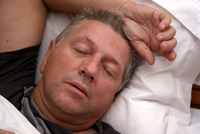|
 Central sleep apnea
Central sleep apnea
By Kenneth D. Weeks MD, FACC, FAASM, Novant Health Sleep
Want to learn more?
Please call to find a sleep health expert:
1-877-99-AWAKE (29253)
|
When you think of sleep apnea, you most likely think of obstructive sleep apnea, or OSA. OSA commonly occurs in adults and is defined by the constant collapse of the airway, which causes breathing to stop. This type of sleep apnea is what we associate with breathing machines and heavy snoring.
A second, less common — but very serious — form of apnea is central sleep apnea, or CSA. CSA occurs when your brain does not send signals to the muscles that control your breathing. It occurs in approximately 10 percent of all patients who are tested for sleep disorders. When suffering from central sleep apnea, you may have pauses in between breaths that last 10 seconds or more. It is considered abnormal if these pauses occur more than five times per hour.
 There is no one cause of CSA; however, it is believed that a sluggish and irregular heartbeat as well as slow circulation could be likely causes of the brain’s failure to send the signal to breathe. If CSA occurs in combination with heart disease, especially heart failure, it can be life-threatening. When CSA is found in hospitalized heart failure patients, it becomes more likely that the patient will be readmitted. There is no one cause of CSA; however, it is believed that a sluggish and irregular heartbeat as well as slow circulation could be likely causes of the brain’s failure to send the signal to breathe. If CSA occurs in combination with heart disease, especially heart failure, it can be life-threatening. When CSA is found in hospitalized heart failure patients, it becomes more likely that the patient will be readmitted.
The signs and symptoms of CSA parallel those of obstructive sleep apnea:
- Fatigue and sleepiness (heart failure patients may not always complain of sleepiness.)
- Morning headache
- Memory loss
- Mood disorders
- Frequent nocturnal urination
- Snoring (often, but not always)
Note: CSA can also be associated with narcotic drug use or recent stroke.
The evaluation for CSA includes a face-to-face visit with a certified sleep specialist as well as a sleep study in a lab. Treatment of CSA varies depending on the patient’s medical history. For example, if you have heart failure or hypertension, aggressive treatment for those illnesses could alleviate CSA. Providing additional oxygen at night, through breathing machines like continuous positive airway pressure (CPAP) and bilevel positive airway pressure (BPAP), can reduce hypoxia and CSA.
Novant Health offers additional therapies for central sleep apnea:
- A sleep image screening device assesses sleep quality in a patient. This device can give us clues about possible unstable sleep and CSA. This device is available at Novant Health Sleep clinics in Charlotte.
- The remedē® System, by Respicardia, is a device similar to a pacemaker that stimulates the diaphragm — the muscle used for breathing – during sleep. This device is currently being used on patients at Novant Health Presbyterian Medical Center.
Although central sleep apnea is not as well known as obstructive sleep apnea, it is not rare. Patients with heart failure should especially be aware of CSA because of the threat of complications.
If you would like to learn more about central sleep apnea or feel like you may be suffering from this form of apnea, Novant Health Sleep specialists are available with the tools to diagnose and treat this condition. Visit NovantHealth.org/sleep for more information.
|

